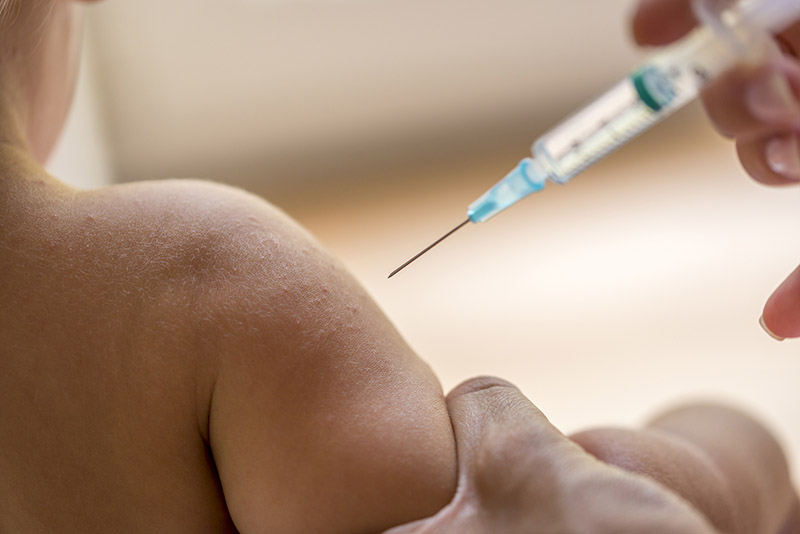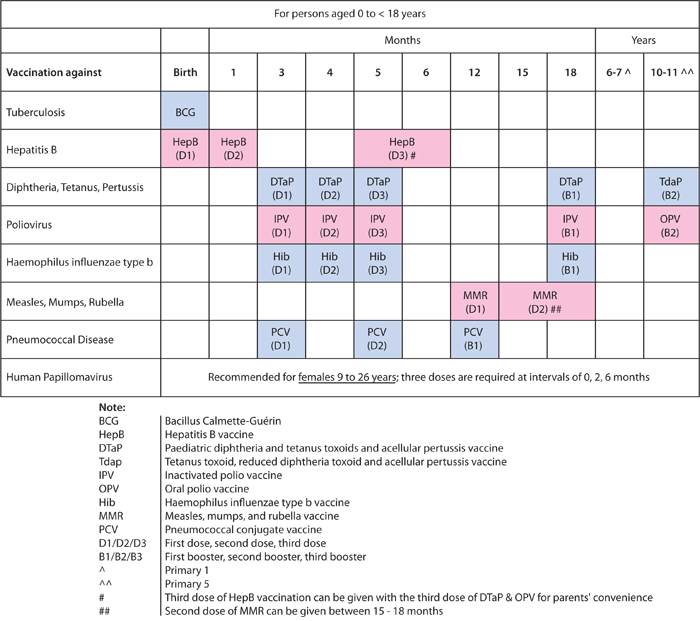Families For Life | Vaccinations - What It is

Immunisation Schedule
Different vaccines work best when given at certain ages. For example, the measles vaccine is usually not given until the child is at least one year old. It may not work so well if given earlier than the recommended age. Some vaccines such as *DTaP / IPV / Hib need to be given as a series of injections to work best.
*Diphtheria/Pertussis/Tetanus (DTaP)
Inactivated Polio (IPV)
Haemophilus Influenzae type B (HiB)
What happens if my child misses a shot?
If your child did not get his/her shots on time, it is not too late.
If your child has gotten some of his/her shots and then fallen behind schedule, he/she can catch up without having to start the whole schedule again.
Combination vaccines
Combination vaccines such as measles, mumps, rubella (MMR) are a few vaccines given together in a single shot. Both doctors and parents like them because it enables a person to receive several vaccines in one go.
The recommended national immunisation schedule is as follows for healthy newborns starting immunisation in Singapore. For overseas-born children, please refer to individual vaccine details for minimum intervals for catch-up doses or unusual schedules.
National Childhood Immunisation Schedule - Singapore
(Reference: National Immunisation Registry)

Immunisation records for children born on or after 1 January 1996 are retrievable at the National Immunisation Registry website.
For parents who would like to obtain additional protection for your children, you may want to opt for the combination and additional optional vaccines, available at selected clinics and hospitals. An alternative schedule with combination or additional vaccines might look like this:

Vaccination checklist
Sometimes a child should not be given a particular vaccine or it should be given at a later date. Therefore, inform your doctor if your child:
is sick today
has any allergies, e.g. egg allergy
has developed a severe reaction after being vaccinated previously
has ever had a seizure or any kind of disorder of the nervous system
does not seem to be developing normally
has a weakened immune system e.g. on steroids or has a cancer
has any household contacts with a weakened immune system e.g. on steroids or has a cancer
has received any blood transfusion (e.g. immunoglobulins) recently.
It will be necessary to bring along the child’s past immunisation record.
Is vaccination safe?
Vaccination is generally a very safe procedure. Like other medications, they can occasionally cause reactions. Most of these are mild, such as a sore arm or mild fever. Serious reactions are rare.
Vaccination with BCG produces a small raised bump 2 weeks later. The raised bump ulcerates within weeks to months later, and heals slowly with scarring. For MMR (measles, mumps and rubella) vaccine, fever and/or mild rash may occurs after 5 days from the time of vaccination. One can also develop a mild chicken pox-like rash after being vaccinated against chicken pox.
If there are any serious reactions, see your doctor as soon as possible. Your doctor can discuss the risks before vaccinating your child. Remember that getting the disease is generally much more serious than the side-effects of the vaccine.
Will vaccines always work?
Vaccinations work most of the time, about 90-99% of the children will develop immunity to them. However, occasionally a child may not respond to a vaccine. This is another reason why all children need to be vaccinated. A child who has not responded to a particular vaccine could be infected by a child who is not vaccinated, but not by one who is immune.
Paying for these vaccinations
You can use up to $400 from your Medisave account per calendar year for certain vaccinations. You can also use your child's Baby Bonus for immunisation programmes at approved healthcare institutions. You can get more information at www.babybonus.msf.gov.sg.
Contributed by:
Infectious Disease Service, Department of Paediatrics, KK Women’s and Children’s Hospital